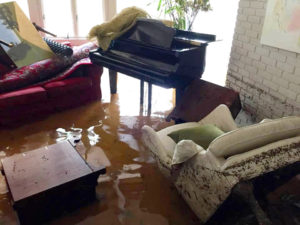As flood waters are receding across South Louisiana, citizens find themselves asking, “What should I be doing now?” From our perspective as professional tax advisors, we know that the answer is: “A lot.”
In this brief blog, we can’t address all of the actions you might be taking as you begin the rebuilding process. But we want to address three that you can begin focusing on now – to help take advantage of possible disaster-related tax positions.
Reconstructing Records after a Disaster
Record reconstruction is very important following any disaster. These records can be essential for income tax purposes, federal assistance, and/or insurance reimbursement. Below are just a few of the many steps that can be taken to reconstruct your records:
- Take photographs as quickly as possible to prove the extent of your damages.
- Sketch pictures of each room so that you can reconstruct what was there, such as furniture.
- Get copies of important documents such as escrow papers, property tax statements, appraisals, and prior-year tax returns.
- Verify improvements made to your residence by getting your contractor to verify his or her work and the costs associated with the improvements.
- Use Kelley Blue Book, the National Automobile Dealers Association (NADA), or Edmunds as resources to help you determine the current fair market value of your vehicle.
- For businesses, obtain copies of invoices from suppliers to determine damaged inventory and use bank statements to determine sales and income.
As a hint, old and new newspapers can be helpful as you try to recreate values. Old newspaper ads are a good source of cost basis of items for which you no longer have records. Recent newspaper ads can help determine the current fair market value of those items.
Employer Non-taxable Disaster Assistance to Employees
For employees residing in the 20 parishes declared major federal disasters in Louisiana, employers are able to help by providing their employees funds to help cover reasonable and necessary expenses that are the result of the flooding, provided certain requirements are met. According to IRS Publication 3833 (Rev. 12-2014), Disaster Recovery:
Internal Revenue Code section 139 provides that qualified disaster relief payments from any source, including employers, reimbursing, or paying individuals’ specified expenses in connection with qualified disasters are not taxable as income and are not subject to employment taxes or withholding.
Furthermore, Publication 3833 states:
Qualified disaster relief payments within the meaning of section 139 include payments received (regardless of the source) for the following expenses:
- reasonable and necessary personal, family, living, or funeral expenses incurred as a result of a qualified disaster,
- reasonable and necessary expenses incurred for the repair or rehabilitation of a personal residence due to a qualified disaster (a personal residence can be a rented residence or one you own), and
- reasonable and necessary expenses incurred for the repair or replacement of the contents of a personal residence due to a qualified declared disaster.
Publication 3822 does state, however, that qualified disaster relief payments do not include the following:
- payments for expenses otherwise paid for by insurance or other reimbursements, or
- income replacement payments, such as payments of lost wages, lost business income, or unemployment compensation
Claiming Losses on Your Tax Return
Taxpayers who have incurred losses due to the flooding in Louisiana have the choice of claiming the losses on the 2015 or 2016 income tax return. Any losses that are not covered by insurance or other reimbursements can be used to lower their tax liability. Typically, losses are deducted within the year that they occur. However, since certain parishes in Louisiana are part of the federally declared disaster area, taxpayers who live in these affected parishes have the option to amend the 2015 tax return to claim the loss. By amending the 2015 return, taxpayers can report the loss and may be able to get a refund. If the taxpayer chooses not to amend, the loss will be reported on the 2016 tax return. Taxpayers have until April 17, 2017, to decide if they want to amend the 2015 tax returns.
Resources
All of these areas can become very complicated as you drill down to the details. To help you make sense of your options and choices, our LaPorte tax professionals in Baton Rouge, Metairie, Covington, and Houma are ready to help you navigate your options and make decisions and choices best suited to your situation and needs.
We also strongly encourage you to access the following resources:
IRS Publication 2194 “Disaster Resource Guide for Individuals and Businesses,” which addresses the activities we have discussed in this article, including reconstructing records and claiming tax losses. The IRS website is one of the best ways to stay abreast of tax requirements that apply after a disaster declaration.
Society of Louisiana Certified Public Accountants (LCPA) website, which provides a comprehensive Disaster Recovery Resource page that can be invaluable in identifying the right resources for your needs.

